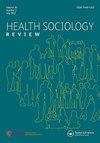导言-特刊,拉丁美洲健康社会学
IF 2.5
2区 医学
Q2 HEALTH POLICY & SERVICES
引用次数: 0
摘要
与社会学的其他子学科一样,健康社会学文献是非常破碎的。一个部门显然是方法论的——尽管混合方法学者做出了非常有趣的贡献,但高端定量和定性技术的专家进行了平行讨论,很少交叉(见De Maio,2010)。值得称赞的是,《健康社会学评论》有着丰富的出版定量和定性工作的历史。但另一个尚未得到充分承认的关键分歧是全球北方和全球南方学者之间的分歧。在大多数情况下,健康社会学的思想并不是全球性的——参与全球健康辩论的时间较晚,也没有从全球南方的工作中吸取教训(Cockerham和Cockerham,2010;De Maio,2014)。我们认为,拉丁美洲健康社会学在更大的领域有很多东西可以提供——既因为它可以教会我们关于拉丁美洲本身的知识,也因为这个学术领域可以教会我们广义的健康和疾病的知识。与Raewyn Connell在《南方理论》(2007)中的论点相呼应,我们认为拉丁美洲的健康社会学为我们提供了我们应该学习的教训,而不仅仅是学习。拉丁美洲健康社会学是在一系列历史、背景和智力因素的影响下发展起来的(Montagner,2008)。与世界其他地区一样,拉丁美洲健康社会学受到医学人类学、公共卫生和医学等学科的影响,每一种视角都有助于确定问题、收集数据和定义研究议程。也许最重要的是,拉丁美洲的社会医学传统——专注于研究社会不平等及其决定健康疾病过程的方式——影响了该地区的健康社会学(Barreto,2004;卡斯特罗,2001年)。这种对社会不平等问题的关注对这一领域产生了持久的影响。拉丁美洲卫生社会学也受到该区域各国一般流行病学概况的影响。Briceño-León(2003)强调,由于该地区的流行病学转型尚未完成,卫生社会学不得不处理新的和旧的流行病学模式。用他的话说,“拉丁美洲的健康社会学同时也是贫困生活条件和富裕生活方式的社会学”(Briceño-León,2003)。区域本文章由计算机程序翻译,如有差异,请以英文原文为准。
Introduction – special issue, Latin American health sociology
The health sociology literature, like other sub-disciplines of sociology, is very fractured. One division is clearly methodological – with specialists in high-end quantitative and qualitative techniques developing parallel discussions and rarely crossing over, despite very interesting contributions from mixed methods scholars (see De Maio, 2010). To its credit, Health Sociology Review has a rich history of publishing both quantitative and qualitative work. But another critical division – and one which has not been sufficiently acknowledged – is the divide between scholars in the global north and the global south. The sociology of health, for the most part, has not been global in its thinking – being late to enter debates in global health and failing to learn lessons from work in the global south (Cockerham & Cockerham, 2010; De Maio, 2014). It is our argument that Latin American health sociology has much to offer the larger field – both for what it can teach us about Latin America in and of itself, but also for what this field of scholarship can teach us about health and illness broadly defined. Mirroring Raewyn Connell’s argument in Southern Theory (2007), we believe that Latin American health sociology offers us lessons that we should learn from, and not just learn about. Latin American health sociology developed under an array of historical, contextual, and intellectual factors (Montagner, 2008). Like in other areas of the world, Latin American health sociology was influenced by medical anthropology, public health, and medicine, among other disciplines – with each perspective helping to shape the identification of problems, the collection of data, and the definition of research agendas. Perhaps most importantly, the Latin American tradition of social medicine – focused on the study of social inequality and the way in which it determines health-illness processes – influenced health sociology in the region (Barreto, 2004; Castro, 2001). This interest in the issue of social inequality has had a lasting impact on this field. Latin American health sociology has also been influenced by the general epidemiological profiles of countries in the region. Briceño-León (2003) has underlined that since the epidemiological transition in the region has not been completed, the sociology of health has had to deal with both the new and the old epidemiological patterns. In his words, ‘the sociology of health in Latin America is at the same time a sociology of the living conditions of poverty and of the lifestyles of the abundance’ (Briceño-León, 2003). The region
求助全文
通过发布文献求助,成功后即可免费获取论文全文。
去求助
来源期刊

Health Sociology Review
Multiple-
CiteScore
7.50
自引率
0.00%
发文量
14
期刊介绍:
An international, scholarly peer-reviewed journal, Health Sociology Review explores the contribution of sociology and sociological research methods to understanding health and illness; to health policy, promotion and practice; and to equity, social justice, social policy and social work. Health Sociology Review is published in association with The Australian Sociological Association (TASA) under the editorship of Eileen Willis. Health Sociology Review publishes original theoretical and research articles, literature reviews, special issues, symposia, commentaries and book reviews.
 求助内容:
求助内容: 应助结果提醒方式:
应助结果提醒方式:


